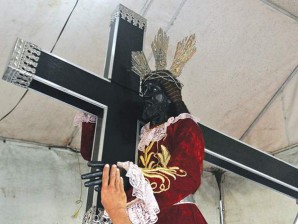In The Know: Feast of the Black Nazarene

FACE OF THE BLACK NAZARENE A devotee touches the hand of the Black Nazarene inside Quiapo Church in Manila. Millions of devotees joined the procession of the Black Nazarene, a life-size wooden statue of Jesus Christ carved in Mexico and brought to the Philippines in the 17th century. RAFFY LERMA
What has come to be known as the Feast of the Black Nazarene every Jan. 9 actually commemorates the traslacion, or journey of the 17th century statue from its original home in Luneta to Quiapo in Manila.
The original Black Nazarene, the dark-colored image of Christ bent under the weight of a heavy cross, was made by an unknown Mexican sculptor and brought to Manila by a Recollect priest.
The icon of Nuestro Padre Señor Jesus de Nazareno was brought by Augustinian Recollect priests to the Church of San Juan Bautista in Bagumbayan, now part of Luneta, on May 31, 1606.
In 1608, the image was enshrined at the bigger Recollect church of San Nicolas de Tolentino in Intramuros. On Jan. 9, 1787, it was transferred to the church in Quiapo, which is also known as St. John the Baptist Church after its patron saint.
Believed to be miraculous, the Black Nazarene has become more famous than Quiapo’s patron saint whose feast is celebrated every June 24. Devotees have attributed miracles and answered prayers to the Black Nazarene.
The image survived the fires that engulfed Quiapo Church in 1791 and 1929, the great earthquakes of 1645 and 1863, and the 1945 bombing of Manila during World War II.
Devotion to the Black Nazarene was encouraged by Pope Innocent X, who issued a papal bull establishing Confradia de Jesus Nazareno in 1650. In the 19th century, Pope Pius VII granted indulgences to people who prayed devoutly to the Black Nazarene.
Sources: Inquirer Archives, www.quiapochurch.com